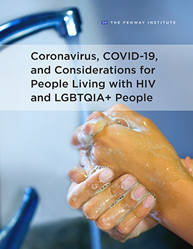
Because of higher rates of chronic disease and risk factors like smoking and vaping, LGBTQIA+ people and people living with HIV should strictly adhere to social distancing guidelines and take care of their health as best they can right now.”
BOSTON (PRWEB)
March 25, 2020
Today, The Fenway Institute of Fenway Health released a policy brief outlining the ways in which people living with HIV and LGBTQIA+ people are likely to be affected by COVID-19 and the factors that may put them at elevated risk for infection.
“Everyone is at risk of infection in this pandemic. But history shows that people who are marginalized and consequently experience disparities in health will suffer disproportionately greater harms than the general population,” said Sean Cahill, Director of Health Policy Research at The Fenway Institute. “Because of higher rates of chronic disease and risk factors like smoking and vaping, LGBTQIA+ people and people living with HIV should strictly adhere to social distancing guidelines and take care of their health as best they can right now.”
People with chronic health conditions, including HIV/AIDS, may be at elevated risk of serious complications from COVID-19. Of most concern are people living with HIV who are not treatment adherent and virally suppressed. People living with HIV should make every effort to adhere to their treatment regimen by taking their HIV medication daily and engaging in other activities to remain healthy such as eating well, exercising, and avoiding tobacco and other substances.
More specifically, people living with HIV should:
-
Ensure that they have at least a 30-day supply of medications on hand; in Massachusetts, under Governor Baker’s emergency declaration, people can get a 60- to 90-day day supply of medication; - Make sure that they are up to date with flu and pneumonia vaccines;
- Establish a plan for clinical care if isolated or quarantined, for example using telemedicine via Skype or FaceTime; and
- Maintain a social network, but remotely—as social contact can help with mental health and also fights boredom.
Due to experiences of discrimination in health care settings as well as the impact of stigma and minority stress on health, LGBTQIA+ people are more likely to have some of the underlying health conditions that could increase their vulnerability if they are exposed to the novel coronavirus.
- Gay and bisexual men, as well as transgender women, have disproportionately higher rates of HIV
- Lesbian women are more likely to have poor or fair health, multiple chronic conditions, heavy driving and heavy smoking compared with straight, cisgender women
- Bisexual women are more likely to have multiple chronic conditions, severe psychological distress, and engage in heavy drinking and moderate smoking
- Lesbians, gay men, and bisexuals of all ages are more likely to be living with disabilities than the general population
- LGBTQ youth have higher rates of sedentarism, pre-diabetes, and diabetes
- LGBT people are more likely to smoke and vape, and to use substances.
- LGBT older adults experience higher rates of social isolation than straight and cisgender age peers
(Citations for the above can be found here.)
“A real concern for LGBTQIA+ people during this pandemic is that we know that they avoid seeking needed health care due to previous experiences of discrimination in health care settings or the fear of experiencing discrimination,” Cahill added. “We’ve also seen new policies enacted at the federal level and in some states that make it easier for health care providers to refuse treatment based on religious or moral beliefs. Discrimination in health care is never acceptable. During an unprecedented global health emergency, this is especially true.”
The policy brief, “Coronavirus, COVID-19, and Considerations for People Living with HIV and LGBTQIA+ People,” can be downloaded as a PDF here.
Since 1971, Fenway Health has been working to make life healthier for the people in our neighborhoods, the LGBTQIA+ community, people living with HIV/AIDS and the broader population. The Fenway Institute at Fenway Health is an interdisciplinary center for research, training, education and policy development focusing on national and international health issues.
Share article on social media or email:

